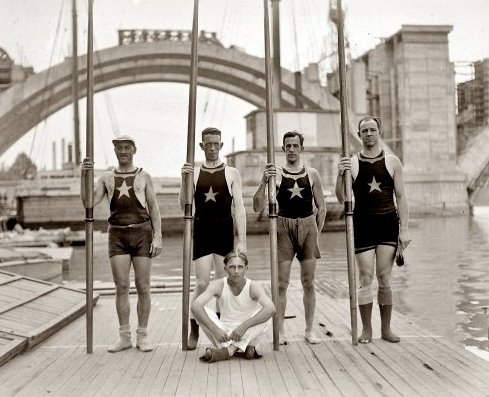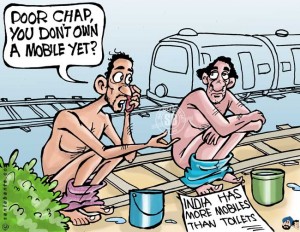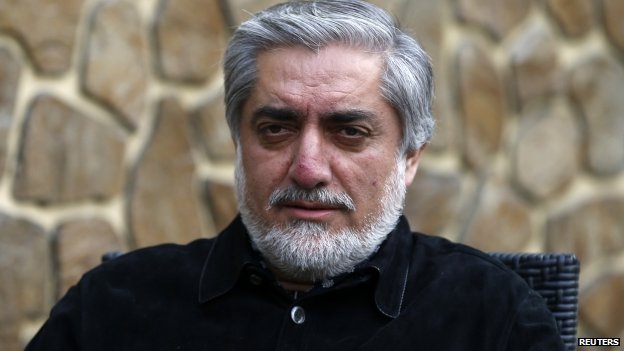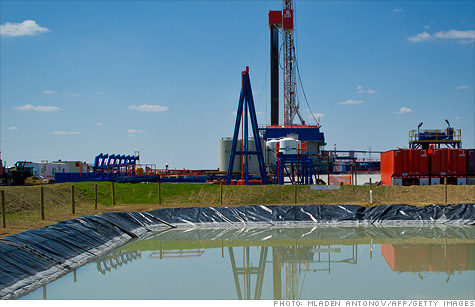« June 2014 | Main | August 2014 »
July 31, 2014
Eat the Rich: Happy Birthday to Steven Joyce Dryden.
Two nights ago in DC's Shaw district, an assorted bunch of us celebrated the birth (July 29), continued existence and never-ending achievements of one Steven Joyce Dryden: father, friend, reporter, editor, world traveler, environmentalist, my college roommate and author of well-regarded Trade Warriors: USTR and the American Crusade for Free Trade, the book on the early days of the U.S. Trade Representative's office. The venue? Eat the Rich, Derek Brown's new oyster bar and restaurant in Shaw. The name alone was perfect for the event, a boomer's birthday. As an undergraduate at Duke, Steve served as Managing Editor of The Chronicle, Duke's student-run daily newspaper, now in its 109th year. I am indebted to him for his early example (i.e., boy wonder) as an editor and as a writer.


Eat the Rich, 7th Street, N.W. Thank you Lindsay for teaching us the ropes.
Posted by JD Hull at 04:21 PM | Comments (0)
A Question of Standing: Does the GOP House have any class? Does it have a good lawyer?
I used to like the GOP more. Whether or not I voted its way on a candidate or an issue, I liked what Republicans brought to the table in the national discourse. We need a two-party system in America. And until House Republicans decided to impeach Bill Clinton in 1998, I had the utmost respect for any articulate bearer of the GOP line. I needed to hear those ideas. But now my enthusiasms are dampened even more. Yesterday, the House 225-201 House voted to authorize a suit against President Obama for failure to implement statue as passed by Congress. See, e.g., today's Politico. Specifically, GOP members of Congress claim they are harmed by the White House's series of reprieves via executive orders on enforcement of a requirement under the Affordable Care Act that employers offer health coverage or pay a penalty--a requirement that most Republicans oppose anyway. At best, the vote gives both Rs and Ds something to spin during the upcoming mid-term Congressional elections. But apart from that, the ideologically-driven vote is embarrassing and petty given the expanded use of executive orders by all modern presidents to tweak statutes. This is a political squabble. Purely political. In addition, it will be difficult for the House to allege in its complaint that the House itself has been injured by any of the president's action. As such, under well-settled constitutional law, no federal court is likely to grant standing to the GOP plaintiffs.
Above: George Thorogood. "And one day in 1998 the GOP members broke real bad and stayed that way."
Posted by JD Hull at 11:54 AM | Comments (0)
July 26, 2014
The Economist has had it with Putin; calls out France, Italy, Germany, US and UK.
The West as Appeasement Weenies? See Russia, MH17 and the West: A web of lies. Screaming excerpts:
Since the murders of the passengers of MH17 the responses have been almost as limp. The European Union is threatening far-reaching sanctions—but only if Mr Putin fails to co-operate with the investigation or he fails to stop the flow of arms to the separatists. France has said that it will withhold the delivery of a warship to Mr Putin if necessary, but is proceeding with the first of the two vessels on order.
The Germans and Italians claim to want to keep diplomatic avenues open, partly because sanctions would undermine their commercial interests. Britain calls for sanctions, but it is reluctant to harm the City of London’s profitable Russian business. America is talking tough but has done nothing new.
Enough. The West should face the uncomfortable truth that Mr Putin’s Russia is fundamentally antagonistic. Bridge-building and resets will not persuade him to behave as a normal leader. The West should impose tough sanctions now, pursue his corrupt friends and throw him out of every international talking shop that relies on telling the truth. Anything else is appeasement—and an insult to the innocents on MH17.
Posted by JD Hull at 11:29 PM | Comments (0)
Prisoner of Rock 'n' Roll: Best rock refrain ever.
Lord, take me downtown,
I'm just lookin' for some tush.--Gibbons, Beard & Hill
Posted by JD Hull at 12:55 PM | Comments (0)
July 24, 2014
Georgetown's Key Bridge Gems: PBC and WCC.
I'm in Washington, D.C. this week. I usually stay on the other side of the Potomac River in downtown Washington. But this week my hotel is in a part of Arlington, Virginia called Rosslyn, a small unincorporated area which is the closest Virginia neighborhood to the heart of The District. My room has a great view of west Georgetown and Georgetown University's Healy Hall. Barely hidden on M Street, which runs parallel to the river, are the iconic long steps used on the movie "The Exorcist". A few hundred feet east down the shore--but also out of the picture--is northern side of the Key Bridge, finished in 1923. The building on the shore is the Washington Canoe Club (WCC), established in 1904, founded by members of the Potomac Boat Club (PBC).


Potomac Boat Club members in 1921. Behind them is Key Bridge under construction.

The Potomac Boat Club, about 100 meters east of the WCC.
Posted by JD Hull at 02:06 AM | Comments (0)
July 18, 2014
The Economist: India steps up to its age-old public sanitation crisis.

Finally, it's all about the toilets. And, more importantly, it's even okay now to talk about it. See The Economist feature Sanitation in India: The Final Frontier in tomorrow's weekly print edition. Excerpts:
Narendra Modi, India’s prime minister, says building toilets is a priority over temples. His finance minister, Arun Jaitley, used this month’s budget to set a goal of ending defecating in the open by 2019. That will be 150 years since the birth of Mohandas Gandhi, who said good sanitation was more important than independence
Ending open defecation would bring immense benefits. Some 130m households lack toilets. More than 72% of rural people relieve themselves behind bushes, in fields or by roadsides. The share is barely shrinking. Of the 1 billion people in the world who have no toilet, India accounts for nearly 600m.
India fares worse on sanitation than a host of poorer places including Afghanistan, Burundi and Congo, partly because too many of its leaders are too squeamish to face up to the issue. Thankfully, that appears now to be changing. The government, gung-ho for infrastructure, has just said it will build 5.2m toilets by September, or one every second.
[I]n spite of rising incomes and better diets, rates of child malnourishment in India do not improve faster. Unicef, the UN’s agency for children, estimates that nearly one-half of Indian children remain malnourished.
Posted by JD Hull at 12:01 AM | Comments (0)
July 15, 2014
Happy 125th Birthday, Coca-Cola.
On this day in 1889, the Coca Cola Company, then known as the Pemberton Medicine Company, was incorporated in Atlanta, Georgia.

Posted by JD Hull at 12:07 PM | Comments (0)
July 14, 2014
Germany 1 Argentina 0
.jpg)
Well-played, both clubs.
Posted by JD Hull at 08:15 PM | Comments (0)
July 11, 2014
In Vox Populi: New article on natural gas fracking.

We believe that the only way for society to change is for people’s voices to be heard. The subject of this dialogue is power--who has it, how is it used, and to what purpose. We welcome your participation.
--Vox Populi to online readers (April 2014)
I just published an article that focuses on the continuing and very shrill dispute over the environmental and safety issues of hydraulic fracturing--or "fracking". Fracking is a drilling method to extract natural gas from reserves underneath public and private lands that are deep and/or difficult to access. The drilling process injects liquids into, and fractures, rock or shale encasing the gas. Critics point out that fracking increases the risk of polluting ground water, soil and air in the areas of the drilling. In the article, I try y to pin down how proponents and opponents really view their arguments, and what each side really wants in the fracking controversy. Is compromise possible? Which issues? What would be a "win" for each side? It's called Commentary on NY Court of Appeals Fracking Decision.
But of equal (if not slightly more) interest to me in this post is publisher Vox Populi itself, the progressive online forum that published my essay. It was co-founded by Michael Simms, a nationally known poet, writer and editor, founder of Autumn House Press, teacher and social activist, and by Nisha Gupta, who will be Vox Populi's first editor. Gupta is also a Ph.D candidate in Clinical Psychology at Duquesne University.
About the forum's purpose, we are given more than just hints. The name comes from the proverb, Vox populi, vox De, which translate from Latin as "the voice of the people is the voice of God." Moreover, if you look at the forum's website, Vox Populi's "tagline" on each web page is A Public Sphere for the Discussion of Contemporary Politics. With these items in mind, and in view of the opening quote above, the Vox Populi forum intends to be very respectable, if not slightly wonky, grass roots clearinghouse of ideas to address real social problems: identifying them, talking about them, evening the playing fields where battles are fought, and crafting sound strategies to solve them. Issue categories already up on the Vox Populi website give us a better idea: Social Justice, War and Peace, Public Education, Environmentalism.
Posted by JD Hull at 01:04 PM | Comments (0)
July 10, 2014
Recession Story: This is what humility, courage and resilience look like.
This op-ed/story has made the rounds since we discovered it last night. Originally, it may have appeared in Newsday on July 8--but it's getting hard to tell as it's been popping up everywhere, albeit with different titles. Anyway, we don't want you to miss it. Darlena Cunha, writer, former television producer and stay-at-home young mother of twins, tells her story in the Washington Post: "This is what happened when I drove my Mercedes to to pick up food stamps".

Darlena Cunha and Family
Posted by JD Hull at 02:14 PM | Comments (0)
July 08, 2014
John Kerry threatens Afghan presidential rivals with "Mother of All Time-Outs."
In the case of Afghanistan, the 'time-out' punishment means a crippling withdrawal of money, guns and American contractors that Afghanistan counts on to even minimally function. As Abdullah Abdullah and Ashraf Ghani compete to replace Hamid Karzai as president of Afghanistan, and the Independent Election Commission continues to count votes from round two of the voting, the United States sees Afghanistan as a raging fire that very soon could get worse.
So Secretary of State John Kerry today issued the strongest possible warning through the U.S. embassy in Kabul. See, e.g, at Reuters, "Kerry warns Afghanistan as thousands rally in support of Abdullah." In it, Kerry emphasized that he's "noted reports of protests in Afghanistan and of suggestions of a 'parallel government' with the gravest concern"--and that this of course could have serious consequences:
"Any action to take power by extra-legal means will cost Afghanistan the financial and security support of the United States and the international community."
Afghanistan is heavily reliant on foreign donors to fund everything from building roads and paying school teachers to security. The United States pays the lion's share of all international aid.
Observers fear that a standoff between Abdullah and Ghani could plunge Afghanistan into disorder, with no clear leader in a country already beset by deep-rooted ethnic divisions.

Abdullah Abdullah. Least objectionable candidate?
Posted by JD Hull at 10:31 AM | Comments (0)
July 07, 2014
[UPDATED] Last Week's Zoning Power-Based Decision by New York Court of Appeals: A "Watershed" for Fracking Opponents?
For the future of fossil fuel extraction in America, here is an important and possibly game-changing development (although I was just informed that French actress Audrey Tautau's upcoming 38th birthday is "just as important, dude, if not more so..."). First, if you need some background, see this June 30 WSJ article, on the decision last week by New York States's highest court to allow municipalities to use their zoning powers to ban the practice of induced hydraulic fracturing--or "fracking"--to drill for natural gas. And see two blog posts by attorneys, both with the New York City office of the well-regarded Natural Resource Defenses Council, who have been covering the litigation: June 30 blog post by Dan Raichel and July 8 blog post by Kate Sinding.
The New York Court of Appeals' ruling is certainly not novel--or really even limited to fracking. That communities may use zoning laws to limit activities on land is black letter law in nearly every American jurisdiction. But the clash of interests on each side of the fracking issue--opponents correctly arguing that the best current methods of extraction threaten natural resources and human health versus large producer-corporations correctly arguing that fracking is getting America closer to energy independence, and at the same time providing good jobs--has been exceptionally intense, loud, emotional, enduring.
Fracking technology is not new--and has been used for over 50 years to extract shale gas, tight gas, tight oil, and coal seam gas. Fracking's methods have never been particularly safe or without environmental risks. Geologists have known for decades about substantial shale natural gas reserves underneath us that fracking methods might be able to extract.
So what's really new? It's the huge, bold, previously unthinkable scale on which more recent fracking methods are based and are now being used all over the country. From the standpoint of the production of energy, and cheaper energy at that, it has been a hands-down success. No question.
Here's the problem, which is largely a matter of public relations. Each of the two respective arguments mentioned above--and this is not always the case, folks--has both merit and broad appeal. And, importantly, the nature of each of these overall arguments allows both sides to affect a certain righteous indignation. Opponents of fracking (i.e., let's protect humans, environment), those on the "David" side, have the advantage here. No one can deny either the morality or rationality of putting humans and nature first.
Fracking proponents (i.e., fracking is the key to American energy independence, and helps create needed jobs), or those in the Goliath camp, appeal to patriotism, energy security, and helping the American economic recovery with jobs. Granted, the energy industry has made a very similar arguments in the past (e.g., compliance with new regs forcing us to upgrade air pollution control equipment is expensive, and will eat up jobs) when faced with environmental barriers. Now, with a huge new supply of cheaper, domestic natural gas in the balance, the energy producer's argument is more compelling than ever. Producers have staff, experts and all manner of hired guns to help make that argument.
So both sides are "right". In government and politics, that can happen. But the sides here are David v. Goliath, and each is apparently willing to devote whatever money, additional resources, passion, organizational time and political capital it has to the fight, and fight indefinitely. That, frankly, is rare. In most cases, the grass roots David side--of veteran activists, new activists, fathers, housewives and college kids, and usually without much of a war chest or qualified lawyers for the long-haul--gets outspent or goes away by now. That has not happened here.
On July 7, The Hill, the daily newspaper covering Congress, wrote about the New York ruling in "'Watershed moment' for fracking foes?", but hasn't identified any significant long-term response from the energy industry. Our take is that the New York decision should and will stick as a matter of basic constitutional law, and will be closely looked at as a roadmap by other state judiciaries in similar cases. From proponents of fracking, you are likely to see a difficult, ardent and slightly demented attempt to 'federalize' fracking, probably under the Commerce Clause and coupled with policy arguments that the importance of energy security should trump local and state rights (which if successful in our judgment would make for bad law).
In any event, fracking, which no one sane and educated really likes, is here to stay, with or with or without zoning constraints, as long as producers keep finding ways to get leases on substantial "new" fossil fuel reserves. For some pols, the unexpected appearance of "successful" fracking on a huge scale is even a bit embarrassing. President Obama, an environmentalist, and Commenter-in-Chief who often chimes in gratuitously on big issues, has stayed away from the issue.
Right now, the best argument anyone can make for fracking is probably this:
"Even though energy companies lack safe, efficient technologies for fracking, we all need the energy source. We need the BTUs".
We know. It's somehow not enough, no matter who you "side" with, is it? So we can expect that in time, Americans will demand either a safer and more environmentally-friendly approach to drilling for hard-to-reach reserves, or require a stronger, more reassuring argument.

Posted by JD Hull at 01:43 PM | Comments (0)
July 01, 2014
Steve Jobs: Genius, Baby Boomer, Sadist.

Image: M. Nudelman/Biz Insider
Oh, the Humanity, Dude: Was Jobs seriously out of line asking employees "what are you working on?"
Business Insider has an interesting short piece on Steve Jobs. Interesting because it's a possible (read: for sure) reflection on generational differences in leadership styles, thick-skinned-ness and senses of humor in the workplace. Born in 1955, Steve Jobs was a Baby Boomer with an off-the-chart work ethic which, whether or not you like Boomers, Boomers are known for. By the time of his death in 2011 he was, at 56, older than most of his employees, many in their 20s and 30s.
Business Insider's Lisa Eadicicco, an accomplished, clearly talented and young (I'm guessing mid-20s from her bio, which makes her all the more impressive) tech news writer, explains "Why Apple Employees Never Wanted To Have Lunch With Steve Jobs". And I list further below Jobs-Apple employee interactions in the piece that help answer the question. In her article, our friend Ms. Eadicicco interviews Apple ex-employee David Black, who worked at Apple for 12 years before leaving two years ago to launch his own start-up. Black notes that whenever Jobs would have his lunch on Apple's patio, "employees would finish their lunches within 15 to 20 minutes" and exit. The idea was to avoid this dreaded scenario:
One of the first things they teach you at Apple is to be prepared to answer [Job's] question, 'What are you working on?'
"No one would fill the seats near him," Black said to Business Insider. "Just because you wanted to be ready for that moment."
Two incidents with interns/employees are cited. In one
Jobs asked an intern what he had been working on while in the elevator. He mentioned that he was doing QA (quality assurance) for a product. Jobs then asked him, 'Why are you going down? You should be going back up to work.'
The kid completely went pale-faced," Black said. "And Steve said 'Hey, just kidding.'
In the other, a luckless intern
ended up in the elevator with Jobs. When he asked her what she was working on, he also asked to see the project right then and there.
"What are you working on?" Brutal. Uncalled for. Oh, the humanity. Seriously, are these dick moves by Jobs? Rudeness? Or opportunities for an employee to shine? A toxic leadership style? Or just another passionate and occasionally abrasive manager-partner-owner asking employees reasonable questions with just a hint of irony and weird humor? In other words, just Steve Jobs being a wry and consummate Baby Boomer?
Am I missing anything here?
Frankly, I can't think of a more reasonable question--even one posed by a guy who intimidated lots of people--than "What are you working on?" And certainly for some with even average moxie that question was an opportunity in glowing lights. Yesterday I asked one Baby Boomer lawyer I once worked with--a real go-getter one, a gunner--what she thought of Jobs's question. Her response:
I would want the interaction with my boss, Jobs. Sell him on my enthusiasm, work ethic, and great next idea- might result in a promotion, a raise, or just good old-fashioned thanks.
Questions?
Posted by JD Hull at 02:22 PM | Comments (0)